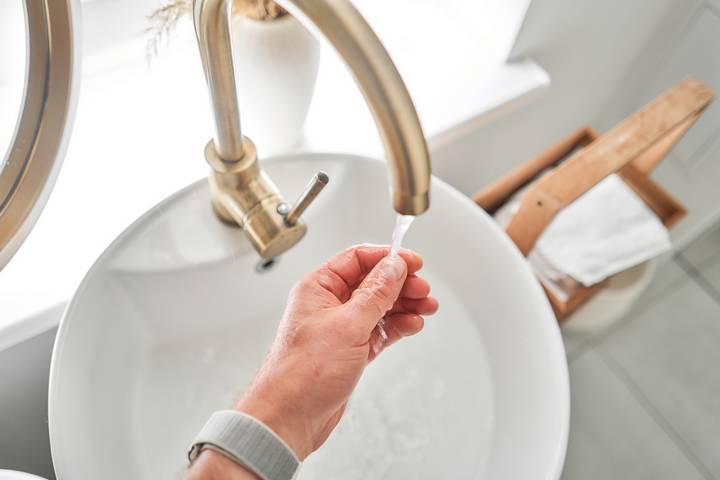
The water supplied to our homes allows us to wash clothes, dishes and our bodies, and while it is a complicated network of pipes and drains, we don’t give it much thought. That is unless the water isn’t flowing properly. Most water flow loss happens with both hot and cold, and it is a matter of the overall liquid coming in. This can be easily narrowed down to find the solution and fix it.
What if it is only the cold water that is restricted? This can be more puzzling, and you are left asking yourself, “Why is my cold water pressure lower than my hot?” Sometimes, you may need a plumber to troubleshoot the issues. In other instances, you may examine the problem yourself.
These are some possible reasons why.
Check the Main Supply

When you turn on the cold water and the water pressure is low, you may think it is localized to that one faucet. Before checking under the sink, see if it is widespread around the house.
Go around and check all the taps to see how the water flows. Is it just the cold water? Is it the cold water on all taps? Is it both cold and hot? If you have an issue with multiple taps, it may be your main supply.
Find its location, typically in the basement or the hot water tank, and confirm it is open. There will also be a hotline and a cold line to check out. If the cold line is turned down, open it fully and check the water in all taps to see if that has corrected the problem.
Inspect the Shut Off Valve Under the Sink

Check the supply line under the sink if your cold water supply is restricted to just one faucet. This lets you quickly shut off the water in case of a leak, clear out a blockage or stop an overflow. It may have been turned or knocked partially closed from several things like:
- Pets
- Kids
- Stored household items
- Recent repair work done
Follow the water line from under the faucet to where there is knob or lever. Turn it clockwise or open it fully and try the faucet again to see if you have more pressure.
Mineral Deposits

Water is full of naturally occurring minerals, but most water supply lines to your home are already filtered out. It’s called hard water; those with their well often have to get a water softener to keep the minerals in check.
Over time, mineral deposits can build up in your water lines, and while this usually occurs in both hot and cold lines, if cold water is used more often, this will have an increased buildup. As the lines get more buildup, less water can pass through, decreasing the pressure.
Different Sized Water Lines

Plumbers use a variety of water lines during installation, and it becomes an intricate network of pipes to reach each sink, toilet, shower and drain. Your cold water pipes may narrow and have more complicated pathways as they travel throughout the house. This can impede the flow of water and reduce the pressure simultaneously.
Debris in Water Lines

Besides mineral buildup, other dirt, debris and sediment can pass through the lines. Hot water is better at removing buildup and washing it away because of the heat, but cold water can do the opposite. The water heater also serves as a trap to filter out foreign objects.
Damaged Water Lines

Sometimes, the issues with your cold water flow come from a damaged pipe. It could be a kink or pinch, rust or corrosion, or a leak that reduces the pressure.
You will have to investigate these issues, so narrow down the areas where the water pressure is affected and inspect the pipes that bring water to those locations.
Faucet Cartridge Problems

Faucets work to direct the flow of both hot and cold water, but they don’t last forever. Over time, they can get mineral buildup, gasket leaks, or malfunctioning parts, affecting the water flow.
It could be the faucet cartridge that is to blame, so if you are handy, you can take the faucet apart and inspect the parts. If it is above your pay grade, hire a plumber to do it for you. While they are there, a plumber can check for other issues and work towards correcting the problem for you.
This is why your cold water pressure is lower than your hot. It will take some effort to find which problem is affecting your water pressure, but once you have fixed it, you will be back in business again, enjoying the free-flowing cold water in all its glory.
